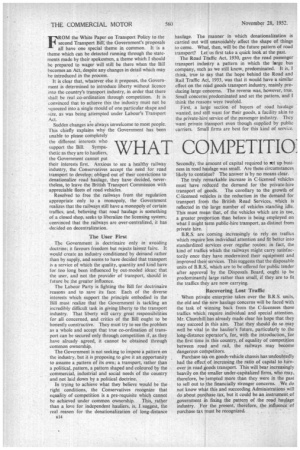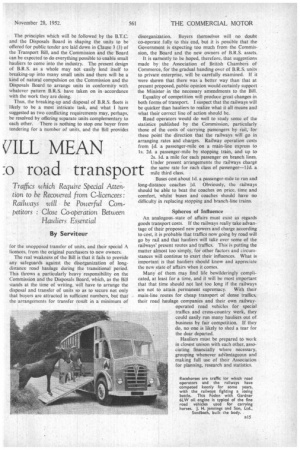WHAT COMPETITIO VIII MEAN
Page 48

Page 49

If you've noticed an error in this article please click here to report it so we can fix it.
FROM the White Paper on Transport Policy to the second Transport Bill: the Government's proposals all have one special theme in common. It is a theme which can be detected running through the statements made by their spokesmen, a theme which I should be prepared to wager will still be there when the Bill becomes an Act, despite any changes in detail which may
be introduced in the process. .
It is clear that, whatever else it proposes, the Government is determined to introduce liberty without licence into the country's transport industry, in order that there shall be real co-ordination through competition. It is convinced that to achieve this the industry must not be squeezed into a single mould of one particular shape and size, as was being attempted under Labour's Transport Act. .
Sudden changes are always unwelcome to most people. This chiefly explains why the Government has been unable to please completely the different interests who
support the Bill. Sympathetic as they are to hauliers, the Government cannot put their interests first. Anxious to see a healthy railway industry, the Conservatives accept the need for road transport to develop; obliged out of their convictions to denationalize road haulage, they have decided, nevertheless, to leave the British Transport Commission with appreciable fleets of road vehicles.
Resolved to free the railways from the regulation appropriate only to a monopoly, the Government realizes that the railways still have a monopoly of certain traffics, and, believing that road haulage is something of a closed shop, seeks to liberalize the licensing system; convinced that the railways are over-centralized, it has decided on decentralization.
The User First The Government is doctrinaire only in avoiding doctrine; it favours freedom but rejects laissez faire. It would create an industry conditioned by demand rather than by supply, and seems to have decided that transport is a service of which the quality, quantity and kind have for too long been influenced by out-moded ideas; that the user, and not the provider of transport, should in future be the greater influence.
The Labour Party is fighting the Bill for doctrinaire reasons and to save its face Each of the diverse interests which support the principle embodied in the Bill must realize that the Government is tackling an incredibly difficult task in giving liberty to the transport industry. That liberty will carry great responsibilities for all concerned, and critics of the Bill ought to be honestly constructive. They must try to see the problem as a whole and accept that true co-ordination of transport can be secured only through competition if, as they have already agreed, it cannot be obtained through common ownership.
The Government is not seeking to impose a pattern on the industry, but it is proposing to give it an opportunity to assume a pattern of its own; a transport, rather than a political, pattern, a pattern shaped and coloured by the commercial, industrial and social needs of the country and not laid down by a political doctrine.
In trying to achieve what they believe would be the right conditions, the Conservatives recognize that equality of competition is a pre-requisite which cannot be achieved under common ownership. This, rather than a love for independent hauliers, is, I suggest, the real reason for the denationalization of long-distance haulage. The anner in which denationalization is carried out willi unavoidably affect the shape of things to come. Wha , then, will be the future pattern of road transport? Let us first take a quick look at the past.
The Road T ffie Act, 1930, gave the road passenger transport indu try a pattern in which the large bus company, such as we still know, predominated. It is, T think, true to say that the hope behind the Road and Rail Traffic Act, 1933, was that it would have a similar effect on the road goods transport industry, mainly producing large concerns. The reverse was, however, true. Small concerns predominated and set the pattern, and I think the reasons were twofold.
First, a large section of buyers of road haulage wanted, and still want for their goods, a facility akin to the private-hire service of the passenger industry. They want private transport even though supplied by public carriers. Small firms are best for this kind of service.
Secondly, the amount of capital required to set up business in road haulage was small. Are these circumstances likely to continue? The answer is by no means clear.
The truly remarkable increase in C-licensed vehicles must have reduced the demand for the private-hire transport of goods. The corollary to the growth of C-licensed vehicles is the reduction in the demand for transport froth the British Road Services, which is reflected in tl large number of vehicles standing idle. This must me n that, of the vehicles which are in use, a greater proportion than before is being employed on what I might term public-hire transport, as distinct from private hire.
B.R.S. are coming increasingly to rely on traffics which require less individual attention and fit better into standardized services over regular routes; in fact, the kind of traffic f which the railways might carry satisfactorily once they have modernized their equipment and improved theii services. This suggests that the disposable units of B.R.S. which are to be offered for public tender after approval by the Disposals Board, ought to be predorninantlY large rather than small, if they are to fit the traffics they are now carrying.
Recovering Lost Traffic When private enterprise takes over the B.R.S. units, the old and the new haulage concerns will be faced with the task of winning back from the C-licensees those traffics which, require individual and special attention. Mr. Churchill has already made clear his hope that they may succeed th this aim. That they should do so may well be vital to the haulier's future, particularly to the long-distance operator's, for, with the introduction, for the first time in this country, of equality of competition between road and rail, the railways may become dangerous competitors.
Purchase tá on goods-vehicle chassis has undoubtedly had the effect of increasing the ratio of capital to turnover in road goods transport. This will bear increasingly heavily on the smaller under-capitalized firms, who may, therefore, be Itempted more than they were in the past to sell out to the financially stronger concerns. We do not know wh t this and succeeding Administrations will do about pur hase tax, but it could be an instrument of government iii fixing the pattern of the road haulage industry. For the present, therefore, the influence of purchase tax must be recognized. The principles which will be followed by the B.T.C. and the Disposals Board in shaping the units to be offered for public tender are laid down in Clause 3 (3) of the Transport Bill, and the Commission and the Board can be expected to do everything possible to enable small hauliers to come into the industry. The present design of B.R.S. as a whole may not easily lend itself to breaking-up into many small units and there will be a kind of natural compulsion on the Commission and the Disposals Board to arrange units in conformity with whatever pattern B.R.S. have taken on in accordance with the work they are doing.
Thus, the breaking-up and disposal of B.R.S. fleets is likely to be a most intricate task, and what I have suggested as two conflicting requirements may, perhaps, be resolved by offering separate units complementary to each other. There is nothing to stop one buyer from tendering for a number of units, and the Bill provides for the unopposed transfer of units, and their special A licences, from the original purchasers to new owners.
The real weakness of the Bill is that it fails to provide arty safeguards against the disorganization of longdistance road haulage during the transitional period. This throws a particularly heavy responsibility on the Commission and the Disposals Board, which, as the Bill stands at the time of writing, will have to arrange the disposal and transfer of units so as to secure not only that buyers are attracted in sufficient numbers, but that the arrangements for transfer result in a minimum of disorganization. Buyers themselves will no doubt co-operate fully to this end, but it is possible that the Government is expecting too much from the Commission, the Board and the new owners of B.R.S. assets.
It is earnestly to be hoped, therefore, that suggestions made by the Association of British Chambers of Commerce, for the gradual handing over of B.R.S. units to private enterprise, will be carefully examined. If it were shown that there was a better way than that at present proposed, public opinion would certainly support the Minister in the necessary amendments to the Bill.
Equality of competition will produce-great changes in both forms of transport. I suspect that the railways will be quicker than hauliers to realize what it all means and what their correct line of action should be.
Road operators would do well to study some of the statistics published by the Commission, particularly those of the costs of carrying passengers by rail, for these point the direction that the railways will go in arranging rates and charges. Railway operation costs from id. a passenger-mile on a main-line express to Is. 2d. a passenger-mile by stopping train, and up to 2s. id. a mile for each passenger on branch lines.
Under present arrangements the railways charge the same rate for each class of passenger--11-d. a mile third class.
Buses cost about ld. a passenger-mile to run and long-distance coaches Id. Obviously, the railways should be able to beat the coaches on price, time and comfort, whilst buses and coaches should have no difficulty in replacing stopping and branch-line trains.
Spheres of Influence An analogous-state of affairs must exist as regards goods transport costs. If the railways really take advantage of their proposed new powers and charge according to cost, it is probable that traffics now going by road will go by rail and that hauliers will take over some of the railways' present routes and traffics. This is putting the matter almost too simply, for other factors and circumstances will continue to exert their influences. What is important is that hauliers should know and appreciate the new state of affairs when it comes.
Many of them. may find life bewilderingly complicated, at least for a time, and it will be most important that that time should not last too long if the ra:ilways are not to attain permanent supremacy. With their main-line routes for cheap transport of dense traffics, their road haulage companies and their own railwayoperated road vehicles for special traffics and cross-country work, they could easily run many hauliers out of business by fair competition. If they do, no one is likely to shed a tear for the dear departed.
Hauliers must be prepared to work in closest unison with each other, associating financially where necessary, grouping whenever adiantageous and making full use of their Association for planning, research and statistics.




















































































